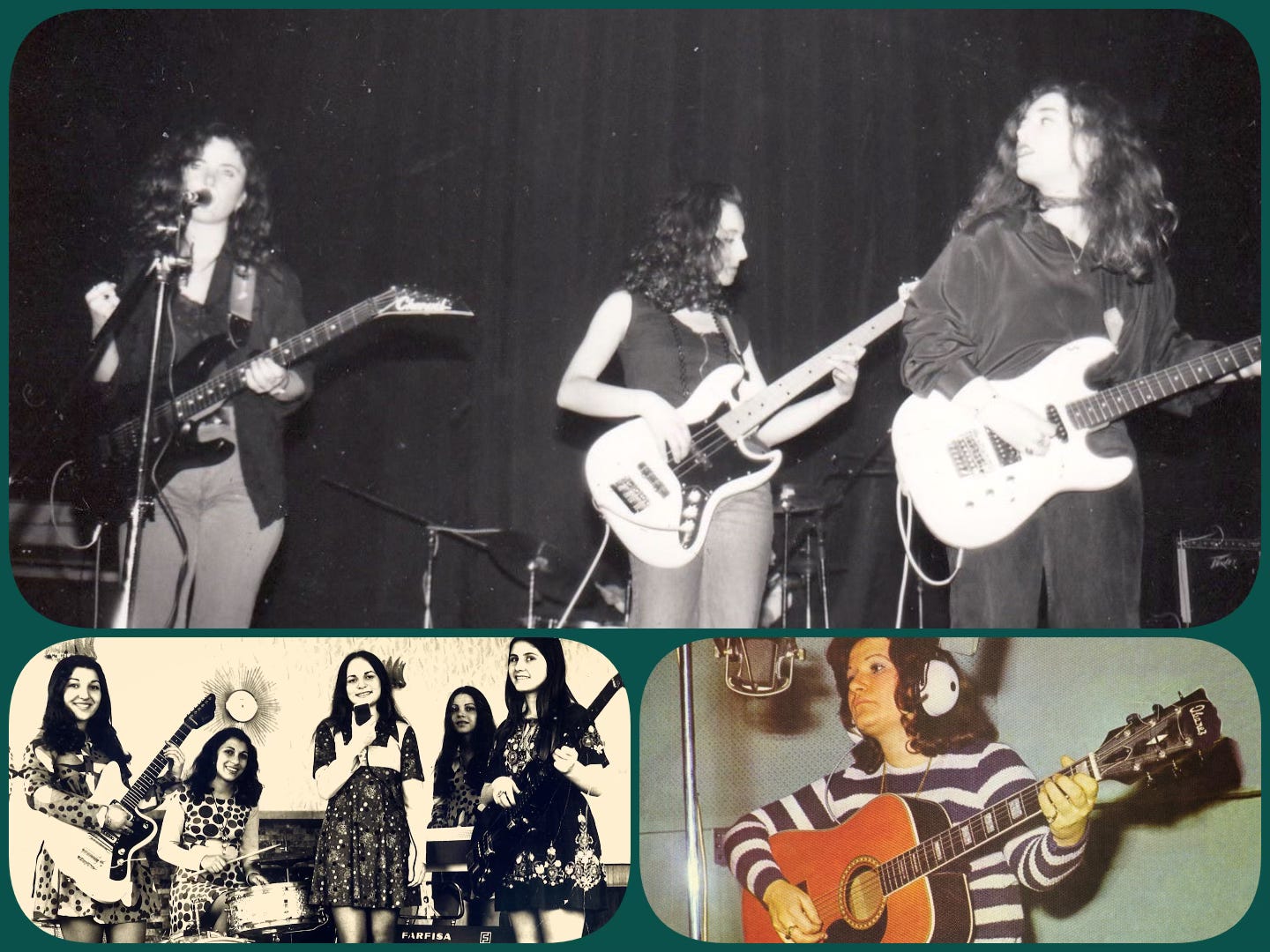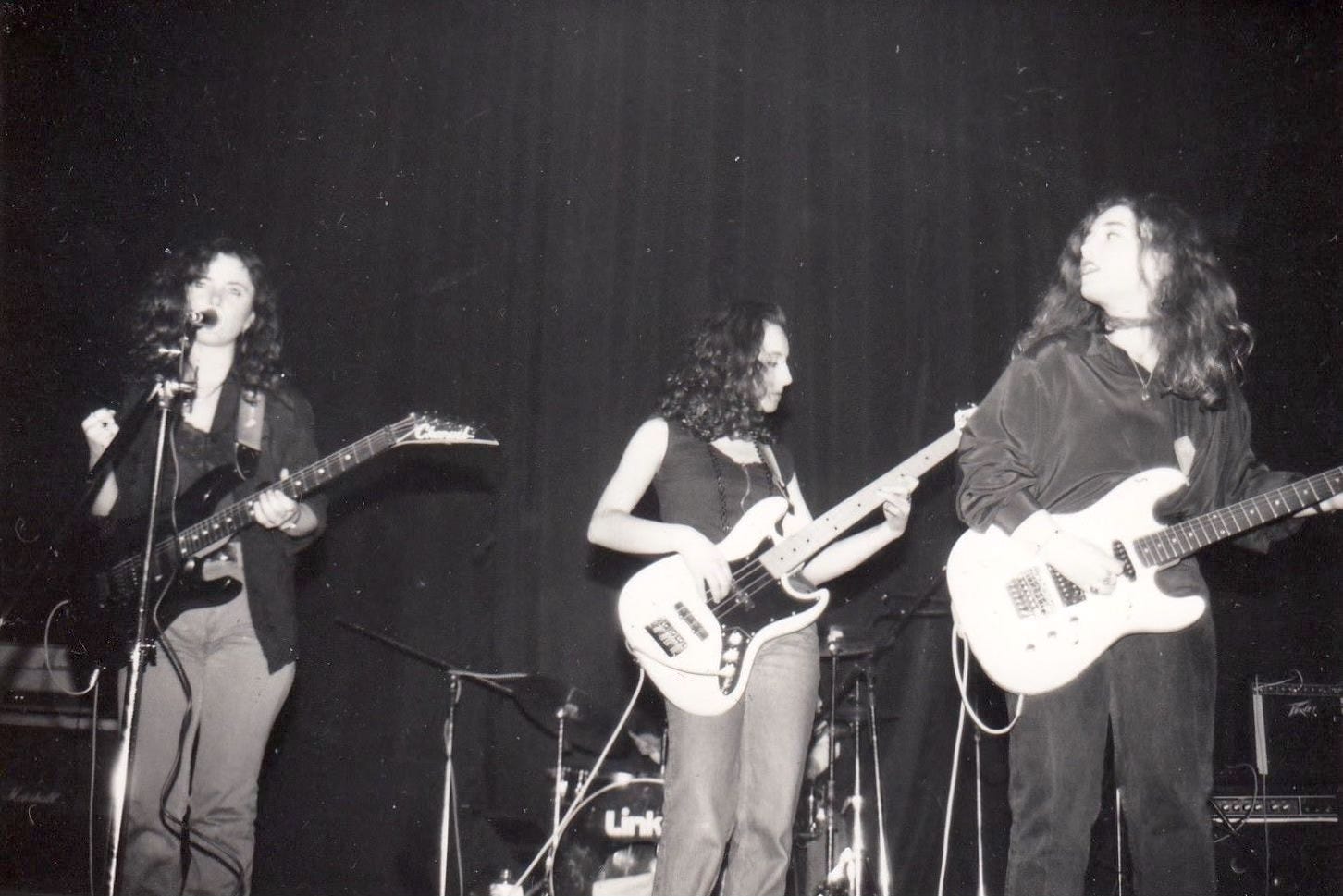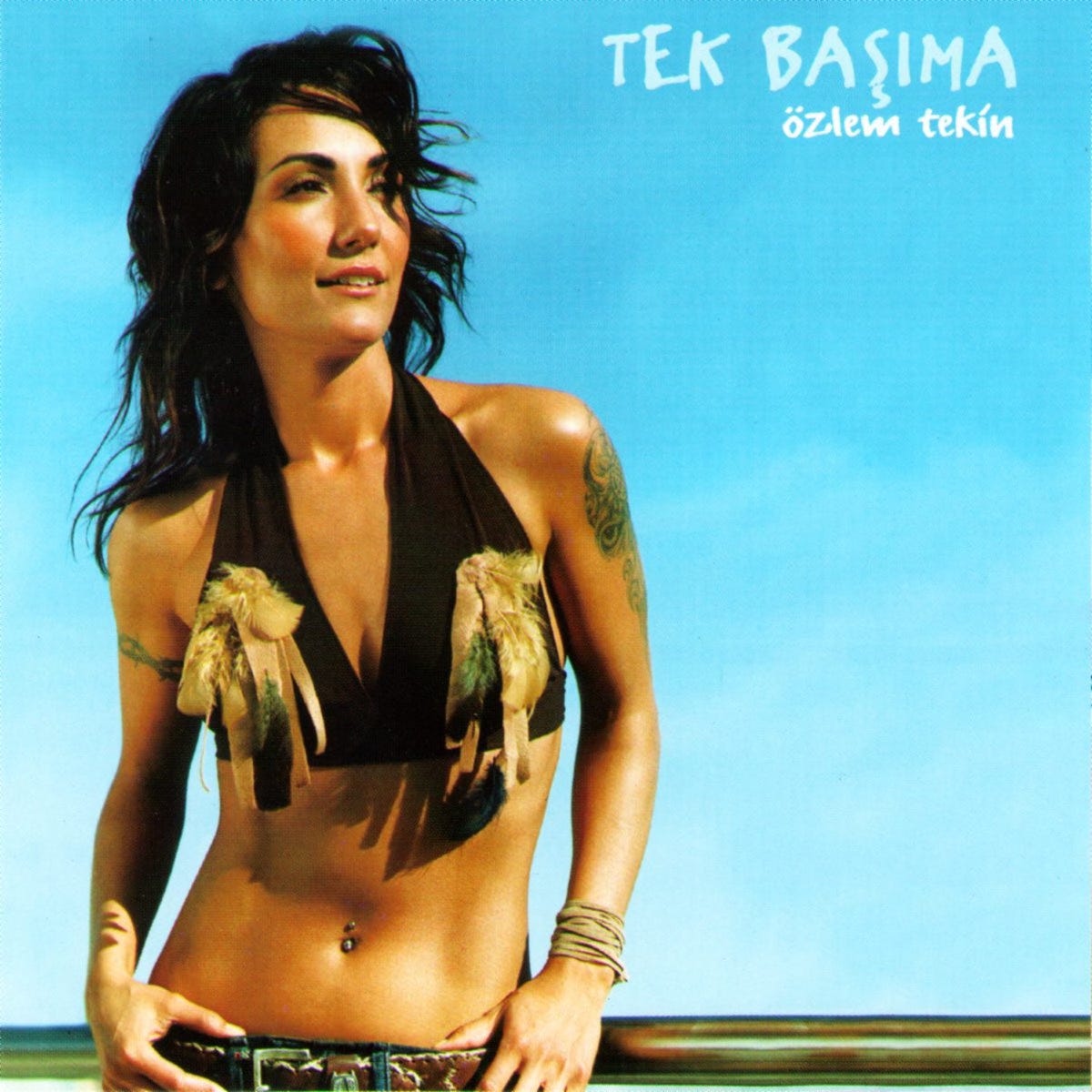Power Reclaimed: Generations of Women Rockers From Turkey to the U.S.
For decades, women rockers from the U.S. and Turkey have rebelled against the patriarchal music industry. Their heritage of reclaiming power from "men in suits" continues strong today.
Sexism is built into the foundations of rock music. This is as true for the rock scene in Turkey as elsewhere in the world, including the birthplace of rock ‘n’ roll: the United States.
How many of you have heard of the band Fanny? More likely than not, you haven’t. They were a rock band founded in 1969 by two Filipina sisters in California. Of course, the U.S. had had rock adjacent women-led bands earlier in the 1960s like the Shangri-Las, but Fanny was something different. It was a band that just happened to have women singing, writing the songs, playing guitar, bass, and drums—it was not a “girl group”. Fanny still doesn’t sound familiar? It’s strange how much they have been erased because Fanny released five studio albums between 1970 and 1974. Some of their singles reached the Billboard Top 100. On tour, they opened for bands like Jethro Tull. David Bowie was famously a big fan of their music, advocating for the band at every opportunity. Even after they broke up their legacy continued to be important. In the 1980s, they inspired women-led bands like the Go-Go's and the Bangles.
Of course, there had long been women rockers, including Sister Rosetta Tharpe who is considered the inventor of rock ‘n’ roll. There are also a number of important frontwomen, like Janis Joplin, Joan Jet, Patti Smith, and Tina Turner. But it took until the 1990s for women in rock to explode into the mainstream once again with Alanis Morisette, Liz Phair, PJ Harvey, Courtney Love, and so on. And today someone like Olivia Rodrigo is drawing on that legacy of angsty, women-led rock music, even working with several female guitarists and instrumentalists rather than having the accustomed set-up of a woman singer backed up by an all-male band.
While all of these musicians are canonical today, Fanny remains to be an obscure act. History has almost totally forgotten this experience of a band fully made up of women. Sexism is, of course, endemic to the music industry. It is not particular just to the U.S. In fact, the first all-woman rock band in Turkey has been all but forgotten, if not for clips that have begun resurfacing on social media from a group called Eroğlu Kızlar Orkestrası.
A forgotten band like Fanny, the Eroğlu Girls Orchestra didn’t even get the chance to have a full career releasing albums and going on tour. In the only video recording we have of them from Turkey’s state-owned TRT channel, we can see them being treated like a novelty act, like a dog standing on its hind legs. After they perform a cover of the Doors’ song Riders on the Storm, the TV presenter interviewing them asks, “Aren’t the drums a male instrument?”
Eroğlu Kızlar Orkestrası quickly disappeared from the scene at a time when male rockers like Erkin Koray, Barış Manço, and Cem Karaca were dominating the airwaves. The one exception to this was Selda Bağcan, who released fiercely political psychedelic rock in the late 1970s. However, she was typically backed by male musicians from the Anatolian Rock world and after releasing her songs from the late 1970s collected on the compilation Türkülerimiz 2 album, she retreated from the rock sound for more acoustic and folk-inspired textures.
It is true that there were always women pushing the boundaries within the pop world. Legendary chanteuse Ajda Pekkan sang empowering anthems like Sana Ne, Kime Ne (What’s It to You?) while Gönül Yazar’s Çapkın Kız (Flirtatious Girl) reclaimed sexuality as a women’s prerogative while refusing to bow down to patriarchal notions of demure behavior. Ajda Pekkan worked mostly with the woman songwriter Fikret Şeneş on her proto-feminist songs. However, whether we look at their hypersexualized cover art or the male record industry executives who shaped their careers, we see that the male gaze was dominant in their presentation while they were always backed up on stage by male musicians.
As in the U.S., it would take until the 1990s for this image of the “bad girl” who refuses to accept gendered stereotypes to be merged with a rock sensibility putting women’s musicianship and control of their work at center stage.
Women Rockers in Early 90s’ Turkey
In this respect, the band Volvox represented the beginning of a new age for women in Turkish rock. Formed in 1988 in the conservative western Turkish city of Bursa with Şebnem Ferah on electric guitar and lead vocals, the band was made up fully of women: Ebru Bank on bass (later replaced by Buket Doran), Gül Ağırca on drums, and eventually Özlem Tekin on the keyboard and back vocals. Eventually, the band relocated to Istanbul and played together until 1994, when Şebnem Ferah and Özlem Tekin, both accomplished musicians, went on to have important solo careers.
Volvox’s status as a band with all women members was a totally new phenomenon in the early 1990s in Turkey. In fact, it led to some confusion on the part of the public. Police famously raided a concert of theirs, as they assumed that the presence of women performers on stage meant that the rock bar where they played was actually a pavyon, a kind of nightclub where women would perform classic Turkish songs for liquored-up male audiences and then visit the tables in a practice often blurring the lines between musical performance and sex work. In fact, the police told the members of Volvox they needed to get a license to keep playing music in an establishment serving alcohol—the same license that a female konsomatris performer at a pavyon was required to get. It apparently took some time to convince the police that Volvox were just musicians who happened to be women. Given these antiquated assumptions, the members of the band would initially be careful to perform without makeup or low-cut clothing to avoid being sexualized.
In the early 1990s, the rock scene was booming in Istanbul. Volvox would perform at legendary hard rock bars like Kemancı, Sis Bar, Dadaist, and Flat Line. However, at this time, Volvox like the other bands of the era would mostly play English-language covers by popular acts like Bon Jovi and Guns N' Roses. Despite the nearly two-decade experiment in Anatolian Rock in the 1960s and 1970s that combined rock instrumentation with original lyrics in Turkish or covers of folk songs, by the 1990s even many local musicians thought that the Turkish language wasn’t suitable for the rock sound. After the 1980 coup cut off young people of Volvox’s generation from the Anatolian Rock legacy, it was bands like Bulutsuzluk Özlemi which showed that Turkish lyrics could still rock. However, it would take until the 1990s for the same to happen with the hard rock scene that Volvox emerged from, a scene heavily focused on American and British acts with local bands like Dr. Skull initially writing their songs in English.
In 1994, Şebnem Ferah left Volvox to start her solo career. Two years later she put out her first album called, simply, Kadın (Woman). With the support of legendary singer and songwriter Sezen Aksu and composer/arranger Onno Tunç, Ferah’s debut was released by the important label Raks Müzik. The album became a major smash in Turkey, building bridges between rock sensibility and pop sound. In particular, Yağmurlar (Rains), Bu Aşk Fazla Sana (This Love Is Too Much for You), and Fırtına (Storm) became instant hits. Songs like Vazgeçtim Dünyadan (I Gave Up on the World) revealed how Ferah dealt with women’s subjectivity in terms of falling in love or depression and hopelessness. There, she famously subverted the cliché of “dying like a man” to describe “dying like a woman.” Other songs from her first album focus on social issues like honor killings, rape, or child brides. In general, she combined a focus on emotional vulnerability common in pop music by women in Turkey with a rebellious rock attitude that asserted a woman’s courage to love whoever or however she wants come what may, or else to reject romance altogether and stand on her own two feet. On Ferah’s subsequent successful albums like the more symphonic metal Can Kırıkları (Shattered Soul) we also hear songs of independence and courage.
SHEER Magazine is Free Today. Still, Your Promise in Help Goes A Long Way for Independent Journalism in Turkey
Özlem Tekin also went on to have an important solo career, but in several respects her trajectory departed from Ferah’s. While in Volvox together sharing vocal duties, Şebnem’s wide vocal range was more suitable for songs by women rockers while Tekin’s low growl was perfect for coves of male rockers. Her image was also harsher, almost masculine. Her first album Kime Ne (Who Cares), released in 1995, included songs like Aşk Herşeyi Affeder mi? (Will Love Forgive All?) which has Tekin openly admitting to cheating on her lover in a moment of desire. Her lyrics often focused on the experiences of a woman living in the big city, candidly describing her life, relationships, and sexual experiences. Important tracks like Duvaksız Gelin (The Bride Without a Veil) touch on gendered violence and patriarchal control through the story of a relative of hers who was forced into an arranged marriage and subsequently killed herself.
However, when it comes to the sound of Tekin’s first album, and its electronic follow-up Öz (Essence), it was quite distant from the hard rock style she knew and preferred, becoming another example of male record executives and producers pushing their vision of what will sell on women musicians. It was her breakout hit Laubali (Flippant) from 1999 that saw her synthesize the pop approach of her first albums with a rock attitude. In the music videos, we see her kick-boxing and running with pit bulls in her characteristic “tomboy” style. The songs, too, deal with emotions like desire, anger, rage, and jealousy. Finally, 2002’s hit Dağları Deldim (I Cut Through Mountains) off the album Tek Başıma (On My Own) became an anthem of feminist empowerment for a generation of young, urban women who longed to break free of the sexist stereotypes and restrictions of the previous generation.
Power Reclaimed: The Voices of Rebellion From Turkey to the U.S.
It’s no accident that Tekin and Ferah were pushing forward this persona of the rebellious women rocker at a time when particularly in North America, musicians and bands like Sleater-Kinney, Veruca Salt, 4 Non Blondes, Hole, and Liz Phair were building on the punk Riot grrrl movement and bringing bold, women-led music to the mainstream. Whether or not Tekin and Ferah were directly influenced by these acts, these kinds of musical movements in one location tend to have global reverberations, inviting others to build their own version of this energy. The appearance of Tekin and Ferah certainly inspired others to follow in their footsteps within Turkey, like the Courtney Love-eque Pamela with her important hit Istanbul or Aylin Aslım with her Avril Lavigne-style pop punk combined with local traditions of the bold, flirtatious girl in songs like Ben Kalender Meşrebim or her roasting of what we now call “toxic masculinity’ in songs like Hoşuna Gitmedi mi?
Nowadays in Turkey, there is a lot of nostalgia for both Şebnem Ferah and Özlem Tekin. Fans long for Ferah to start giving concerts again while many of still wonder exactly what happened to Tekin that caused the latter gave up on her career years ago. The conventional story is that while Ferah received the blessing and support of queen-maker Sezen Aksu, Tekin was intentionally pushed out of the music scene. In this way, we see that the relationships between women musicians are unfortunately not always ones of solidarity. But why should there have been only room enough for one women rocker?
Today, across the world we see a growing renaissance of women-led bands like Bully and Wet Leg or fully female bands like The Last Dinner Party. Touring her latest album GUTS, Olivia Rodrigo not only played with a band made up only of women musicians but brought out 90s alt-rock legends the Breeders as opening act, thereby making important connections between generations of women rockers. It seems we’re in a prime moment for a revival of this 1990s energy which shaped Turkey as much as other parts of the world. Fusion artists like Gaye Su Akyol or underground punk rockers Emaskülator have been keeping this energy alive in different parts of the local scene.
There is also Simge Pınar, who in her first two albums put forward an indie rock energy while musician Beliz is creating slightly more twangy folk rock. Perhaps the closest contemporary example to people like Pamela and Aylin Aslım is someone like Kıvılcım Ural in sassy, jangy guitar rock songs like İstanbul Senden Korkmam (Istanbul, I’m Not Scared of You). I think we are primed for a revival of insouciant, rebellious, 90s-inspired alt-rock. With predecessors from Fanny to Eroğlu Kızlar Orkestrası being rediscovered while Şebnem Ferah and Özlem Tekin still preserve their loyal fan bases, now is the time for a new generation of bold women rockers.
Hi, we hope you have enjoyed reading our article! While you are here, kindly take a moment to listen to our playlist below, which brings together songs mentioned in the article and beyond, including Fanny, Ajda Pekkan, Özlem Tekin, Şebnem Ferah, Olivia Rodrigo, and more. All tracks are handpicked and curated by SHEER Magazine’s writers.







